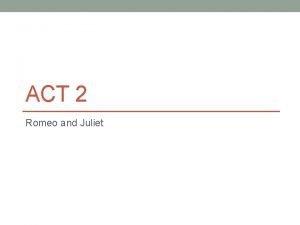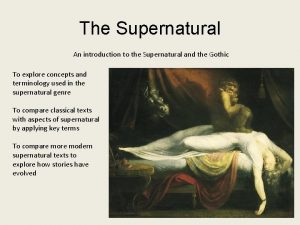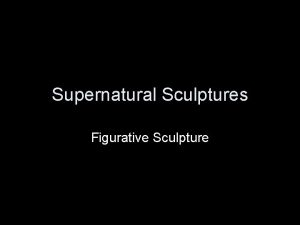Magic and supernatural As a prologue the Chorus





- Slides: 5


Magic and supernatural • As a prologue, the Chorus tells us what type of play Doctor Faustus is. It is not about war and courtly love, but about Faustus, who was born of lower class parents. This can be seen as a departure from the Medieval tradition; Faustus holds a lower status than kings and saints, but his story is still worth telling. It gives an introduction to his wisdom and abilities, most notably in academia which he excels so tremendously that he is awarded a doctorate. During this opening, we also get our first clue to the source of Faustus' downfall. Faustus' tale is likened to that of Icarus, who flew too close to the sun and fell to his death when the sun melted his waxen wings. This is indeed a hint to Faustus's end as well as bringing our attention to the idea of hubris (excessive pride) which is represented in the Icarus story. • Faustus comments that he has reached the end of every subject he has studied. He appreciates Logic as being a tool for arguing; Medicine as being unvalued unless it allowed raising the dead and immortality; Law as being upstanding and above him; Divinity as useless because he feels that all humans commit sin, and thus to have sins punishable by death complicates the logic of Divinity. He dismisses it as "What doctrine call you this? Que sera, sera" (What will be, shall be). • He calls upon his servant Wagner to bring forth Valdes and Cornelius, two famous magicians. The Good Angel and the Bad Angel dispense their own perspective of his interest in Satan. Though Faustus is momentarily dissuaded, proclaiming "How am I glutted with conceit of this? ", he is apparently won over by the possibilities Magic offers to him.

• Faustus' absence is noted by two scholars who are less accomplished than Faustus himself. They request that Wagner reveal Faustus' present location, a request which Wagner haughtily denies. The two scholars worry about Faustus falling deep into the art of Magic and leave to inform the King. • Faustus summons a devil, in the presence of Lucifer and other devils although Faustus is unaware of it. After creating a magic circle and speaking an incantation, Faustus sees a devil named Mephistophilis appear before him. Faustus is unable to tolerate the hideous looks of the devil and commands it to change its appearance. Faustus, in seeing the obedience of the devil (for changing form), takes pride in his skill. He tries to bind the devil to his service but is unable to because Mephistophilis already serves Lucifer, the prince of devils. Mephistophilis also reveals that it was not Faustus's power that summoned him but rather that if anyone abjures the scriptures it results in the Devil coming to claim their soul. • Mephistophilis introduces the history of Lucifer and the other devils while indirectly telling Faustus that hell has no circumference and is more of a state of mind than a physical

• The supernatural pervades Doctor Faustus, appearing everywhere in the story. Angels and devils flit about, magic spells are cast, dragons pull chariots (albeit offstage), and even fools like the two ostlers, Robin and Rafe, can learn enough magic to summon demons. Still, it is worth noting that nothing terribly significant is accomplished through magic. Faustus plays tricks on people, conjures up grapes, and explores the cosmos on a dragon, but he does not fundamentally reshape the world. The magic power that Mephastophilis grants him is more like a toy than an awesome, earth-shaking ability. Furthermore, the real drama of the play, despite all the supernatural frills and pyrotechnics, takes place within Faustus’s vacillating mind and soul, as he first sells his soul to Lucifer and then considers repenting. In this sense, the magic is almost incidental to the real story of Faustus’s struggle with himself, which Marlowe intended not as a fantastical battle but rather as a realistic portrait of a human being with a will divided between good and evil.

• Magic is a motif that plays a major role in Dr. Faustus’ downfall began with his love of knowledge, which leads for his need to use magic. Faustus loves the praise that he gets when people view him as a ‘genius’, which supports his need to have ‘special powers’. • Faustus enjoys playing tricks on people by using his powers, and even goes so far as to use his powers on a dragon. He summons demons with magic, and later brings Helen of Troy to comfort him in his final hours. The use of magic is a show of Faustus’ ‘demoralization’. He no longer wants to be a mere mortal. . . he wants to be as powerful as the devil himself. • One of the most apparent themes in Doctor Faustus is the battle between good and evil. At the beginning of the play, Faustus finds himself torn between good and evil, knowing the distinction and consequences of the two, but overwhelmed by his desire for worldly pleasures. Faustus’s desire for mortal satisfaction is personified through the seven deadly sins who all speak to him and tempt him. Nicholas Kiessling explains how Faustus’s sins brings about his own damnation, saying: “Faustus’ indulgence in sensual diversions, for, once being committed to the pact with Satan, Faustus partakes of the sop of sensuality to blot out his fears of impending damnation”Another illustration of Faustus’s battle between good and evil is shown through the good and evil angels which try to influence his decisions and behavior. Kiessling says, “Although Faustus does not heed the plea, Marlowe very evidently implies that the chance for redemption still exists”[Although Faustus recognizes the consequences of choosing to listen to the evil spirit over the good spirit, he cannot resist the temptations of the devil and the worldly and mortal pleasures he offers.









